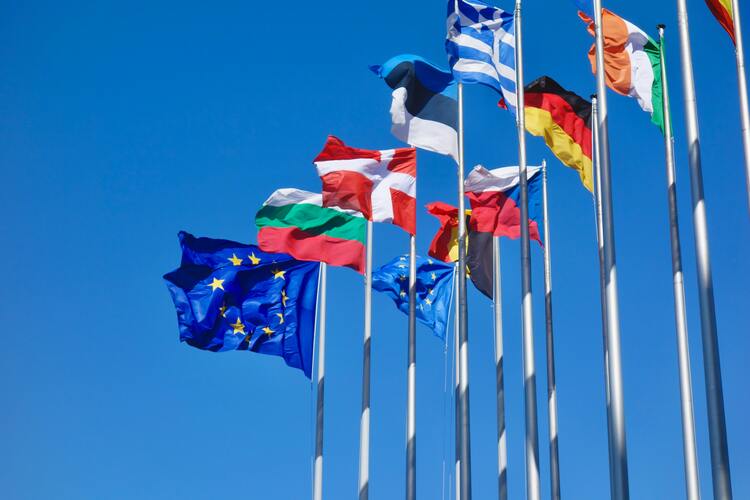There is such an array of benefits to living and working within the member countries of the European Union that it is no wonder so many non-EU nationals want to become EU citizens.
Fortunately, for those born outside the EU, there are several ways to get EU citizenship, each with differing timescales and processes. In this guide, we’ll explain all of your options.
If you’d like further support, our team of international experts can advise and guide you on all aspects of gaining residency and citizenship in the EU. Contact us today to organise a free consultation.
What Are The Advantages Of Having EU Citizenship?
First, let’s consider why EU citizenship is so desirable. The main benefits are:
- Freedom to live and work in several countries
- Opening access for business to many different markets
- Possible tax advantages
- Ease of movement between all of the EU countries plus the three countries in the European Economic Area (Iceland, Lichtenstein and Norway) and Ireland.
- Visa-free access to up to 188 countries across the world
- Protection of the consulate of any EU country travelled to
- A safe haven in times of social or economic unrest
- Healthcare and educational advantages
- The right to vote and run for office in EU elections
- Protection of EU privacy laws
- Owning property without having to obtain a permit
- Passing EU citizenship onto spouse, dependent children, and future generations
How To Get EU Citizenship – 3 Options
If you want to obtain EU citizenship, there are three main options available: citizenship by descent, by naturalization, or by investment. Let’s take a deeper look at each option.
Obtaining EU Citizenship By Descent
If you have a close relative who is an EU citizen, you may be able to claim citizenship through your relationship with them.
A close relative is usually defined as a parent but, in some cases, a grandparent or great-grandparent is acceptable. Regardless, your relative must not have relinquished or lost their EU citizenship, even if they no longer live in the EU.
The following countries allow for citizenship by descent. Those marked with an asterisk allow citizenship up to the third generation, ie the great-grandchildren of EU citizens can qualify:
- Australia, Belgium, Bulgaria*, Croatia, Cyprus, Czech Republic, Denmark, Estonia, Finland, France, Germany, Greece*, Hungary*, Ireland*, Italy*, Latvia, Lithuania*, Luxembourg*, Malta, Netherlands, Poland*, Portugal, Romania, Slovakia*, Slovenia, Spain, Sweden.
The process of gaining citizenship by descent differs from country to country, but typically involves the same basic steps:
- You need to collect and submit documents that prove your lineage and the citizenship of your relative(s). The most common are birth, marriage, and death certificates. You might need to legalize and translate the documents into the official language of your chosen country.
- After gathering all required documents, you apply to the relevant national authority, which could be a consulate abroad or a government office in the country.
- Your application is reviewed. You may be required to attend an interview or provide further information.
- If successful, you’ll receive confirmation and can then apply for a passport.
The whole process usually takes 6-12 months, but it really depends on your circumstances – complex cases will, naturally, take longer.
Obtaining EU Citizenship By Naturalization
If you’ve already been living and working in an EU country for several years, then you may be able to gain citizenship through the naturalization process.
At its core, naturalization means you’ve been a resident in a country for enough time to be able to claim citizenship of that country and, by extension, the EU. Alternatively, naturalization can be obtained by marriage to an EU citizen.
All EU countries offer a path to citizenship through naturalization, but the requirements vary from country to country. Typically, the main requirements are:
- Living and working in the country for a certain number of years, typically between 5 and 10, depending on the country’s laws. In Spain, the requirement is just one year if you are married to a Spanish citizen.
- Demonstrating a certain level of proficiency in the country’s official language(s).
- Passing a test or interview to demonstrate knowledge of the country’s history, culture, and legal principles.
- Showing that you can support yourself (and your family, if applicable) without relying on public funds.
- Having a clean criminal record.
The naturalization process is relatively simple. Once you’ve lived in your host country for the required number of years, you can apply to the government department responsible for citizenship claims. You’ll be required to show proof of your residency, along with other details like employment records.
You’ll then be invited to perform any required tests or interviews before your application is subject to a background check.
Once your application is approved, you may need to swear an oath of allegiance to the country, after which you’ll receive your citizenship certificate.
Obtaining EU Citizenship By Investment
Several EU countries offer investment programs which can lead to citizenship. Simply, these programs allow you to invest a sum of money (usually in property or a government fund) in exchange for a passport.
There are two types of investment programs:
- Citizenship by Investment: A direct route to citizenship, where you are granted citizenship immediately after investing. There is only one such program available in the EU at the moment, Malta’s CIP, which can lead to citizenship in just one year.
- Residency by Investment: An indirect route to citizenship, where you are first granted residency rights (commonly known as a Golden Visa). Then, you can apply for citizenship after a set period – usually a minimum of five years. There are plenty of Golden Visa programs in the EU to choose from: Cyprus, Greece, Hungary, Malta, Monaco, Portugal, and Spain.
Almost anyone can apply for the investment programs. As long as you have proof of funds, a clean criminal record, and are over 18, you’re eligible. EU member states have suspended applications from citizens of certain countries in the past (for example, Russia and Belarus), so it’s worth speaking to one of our advisors to check the current state of play.
What are the best routes to EU citizenship by investment currently?
- Malta’s citizenship by investment program is a great option for those wanting the fastest possible route to EU citizenship. For investing €750,000 into a non-refundable government fund, individuals are fast-tracked to citizenship in just 12 months – affording them full rights across the EU. Alternatively, there is an option to invest in real estate for €700,000, with citizenship granted after three years.
- Cyprus’ Golden Visa program requires an investment of just €300,000 in exchange for a permanent residence permit. You can apply for citizenship after maintaining the investment for five years. Until recently, Cyprus had a fast-track program for European citizenship by investment, which although expensive at a minimum donation of £2,150,000, resulted in citizenship in just six months. However, the program is currently suspended
- Portugal’s Golden Visa program is similar to Cyprus, with citizenship applications available after five years but the initial investment for a residency permit is €500,000.
- Hungary’s Golden Visa program is the newest kid on the block. It’s also the most affordable with an investment requirement of just €155,000. The Hungarian government will accept citizenship applications after 8 years of residency.
- Many other EU countries offer permanent residency leading to citizenship, although the fastest routes are noted above. Others, for example, Austria, Italy, Germany, Spain and Greece, can take up to ten years to grant citizenship after residency.
Obtaining Citizenship In The EU – A Comparison Of The Options
| Criteria | Citizenship by Descent | Citizenship by Naturalization | Citizenship by Investment |
|---|---|---|---|
| Eligibility | Must be related to EU citizen(s) | Must have resided in an EU country for a set period | Must have made a significant investment in an EU citizenship or residency program (real estate, business, government bonds, etc.) |
| Process | Document proof of lineage, application submission to relevant authority | Residency, language and integration tests, application submission, background check | Making the investment, application submission, sometimes residency or visitation |
| Processing Time | 6-12 months, varies by country | 5-10 years, plus 6-12 months for the application | 1-5 years, varies by program |
| Residency Requirement | Not required | 5 to 10 years, varies by country | Minimal or not required, varies by program |
| Language Proficiency | Varies by country, not always required | Required, level varies by country | Varies, not always required |
| Cultural or Civic Knowledge | Not usually required | Required in most countries | Not usually required |
| Investment Requirement | Not required | Not required | Required, minimum amounts vary significantly by country |
EU Citizenship vs Residency
So far, we’ve talked extensively about citizenship and residency. If you’re wondering how they differ, we’ll explain:
- If you’re granted citizenship by one of the member states, that confers EU citizenship. Citizenship means you have the same rights as any EU citizen. You can live, work, and study wherever you wish within the EU member states, vote in elections, and more. It cannot be revoked and you will be provided with a European passport.
- Residency is different. Residency means you can live, and sometimes work and study, in a specific EU country for the period specified on your residence permit (it’ll either be permanent or temporary). Residents do not have the same freedom of movement rights as EU citizens, but you can easily apply for a Schengen Visa for 90 days of travelling visa-free across the EU each year. As we’ve explained above, residency can lead to citizenship after several years.
Summary
Hopefully, you now better understand how to get EU citizenship and the options available. The three main options to obtain citizenship – by descent, by naturalization, and by investment – mean there are routes for people from all backgrounds and situations.
If you’re interested in the investment route, our team can help. We provide end-to-end, specialist support with applications to the various investment programs available in Europe.
You can contact our team of friendly and knowledgeable experts for a free consultation to discuss your requirements and begin your journey towards an EU passport.













